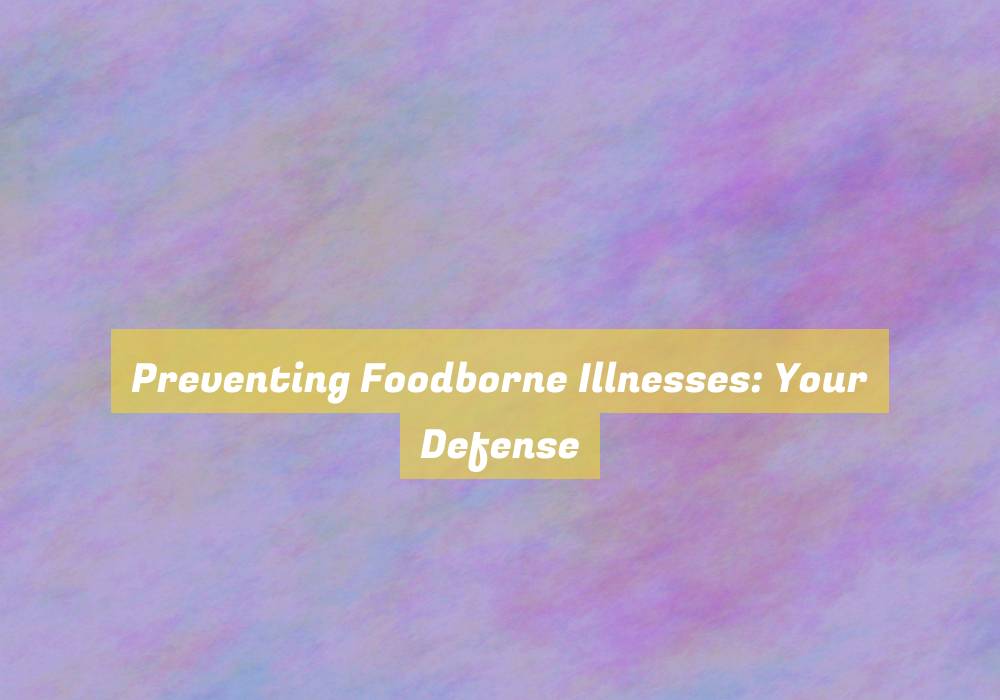Preventing Foodborne Illnesses: Your Defense
So, youG??ve always wanted a little extra excitement in your life, but dodging foodborne illnesses probably isnG??t the kind of thrill you had in mind.
Well, fear not because there are practical steps you can take to defend yourself against these invisible foes lurking in your food.
From mastering the art of proper food handling to understanding the significance of hygiene practices, you hold the power to keep those pesky pathogens at bay.
But wait, thereG??s more G?? effective food storage methods also play a crucial role in your defense.
Understanding Food Safety Risks
To protect yourself and others from foodborne illnesses, itG??s crucial to understand the various food safety risks present in the preparation and handling of food. One of the main risks to consider is cross-contamination, which occurs when bacteria from one food item spread to another through direct or indirect contact. This can happen when using the same cutting board or utensils for raw meat and fresh produce without proper cleaning in between.
Another significant risk is improper cooking temperatures. Undercooking meat, poultry, seafood, and eggs can leave harmful bacteria alive and able to cause illness. ItG??s essential to use a food thermometer to ensure these items reach the recommended internal temperatures.
Furthermore, inadequate storage of perishable foods can lead to bacterial growth. Refrigeration at the appropriate temperatures (below 40-?F/4-?C) and proper storage of leftovers are crucial in preventing the multiplication of bacteria.
Lastly, poor personal hygiene poses a risk. Failing to wash hands thoroughly, especially after handling raw meat or using the restroom, can transfer harmful bacteria to the food you prepare or consume.
Understanding and addressing these food safety risks are vital steps in preventing foodborne illnesses.
Proper Food Handling Techniques
Practicing proper food handling techniques is essential for preventing foodborne illnesses and ensuring the safety of the food you prepare and consume.
Start by washing your hands thoroughly with soap and warm water before and after handling food, especially raw meat, poultry, seafood, and eggs.
Use separate cutting boards for these raw products to avoid cross-contamination with ready-to-eat foods like fruits and vegetables.
When storing food, make sure to keep raw meats separate from other items in the refrigerator to prevent any drips or leaks from contaminating other foods.
Additionally, cook food to the appropriate internal temperatures using a food thermometer to ensure that harmful bacteria are destroyed.
Leftovers should be promptly refrigerated at 40-?F or below to slow the growth of any bacteria.
When reheating, make sure the food reaches an internal temperature of 165-?F.
Lastly, be mindful of expiration dates and discard any food that has passed its prime.
Importance of Hygiene Practices
Maintain good personal hygiene to prevent the spread of harmful bacteria and reduce the risk of foodborne illnesses. Proper hygiene practices are crucial in the kitchen and when handling food.
Washing your hands with soap and warm water before and after handling food, using the bathroom, or touching pets is essential. Additionally, itG??s important to keep your kitchen and cooking utensils clean. Regularly sanitize countertops, cutting boards, and utensils to prevent cross-contamination.
Avoid preparing food if youG??re sick, especially if you have symptoms like diarrhea, vomiting, or a fever. Illness can easily spread through food handling, so itG??s important to prioritize hygiene to protect yourself and others.
Furthermore, remember to keep your food storage areas clean and organized. Properly store raw meats to prevent drips onto other foods and use separate cutting boards for raw meats and produce.
Effective Food Storage Methods
Proper food storage is essential for preventing foodborne illnesses and maintaining the quality and safety of your food. One of the most effective methods is to keep raw meat, poultry, and seafood in sealed containers or plastic bags on the bottom shelf of the refrigerator. This prevents their juices from dripping onto other foods and causing contamination.
Leftovers should be refrigerated promptly in shallow containers to allow for quick cooling. Additionally, perishable items such as dairy products and eggs should be stored at the back of the fridge where the temperature is most consistent.
Dry goods like grains, flour, and cereals should be kept in airtight containers to protect them from pests and moisture. Canned goods should be stored in a cool, dry place, and itG??s important to check for any signs of damage or rust before consuming.
When freezing food, ensure itG??s tightly wrapped in moisture-proof packaging to prevent freezer burn.
Conclusion
So, remember to always wash your hands. Separate raw and cooked foods. Cook foods to the right temperature. Refrigerate perishable foods promptly.
By following these simple steps, you can greatly reduce the risk of foodborne illnesses and keep yourself and your loved ones safe.
Stay informed, stay vigilant, and enjoy your meals with peace of mind.

I really appreciate how you highlighted the often-overlooked risks of cross-contamination in food safety. It reminds me of the importance of not just following guidelines, but truly understanding the science behind our practices. For instance, I’ve started using color-coded cutting boards to keep raw meats and veggies separate, and it’s been a game changer in my kitchen!